Igus India Expands Presence With New Manufacturing Plant
- By Gaurav Nandi
- August 22, 2024
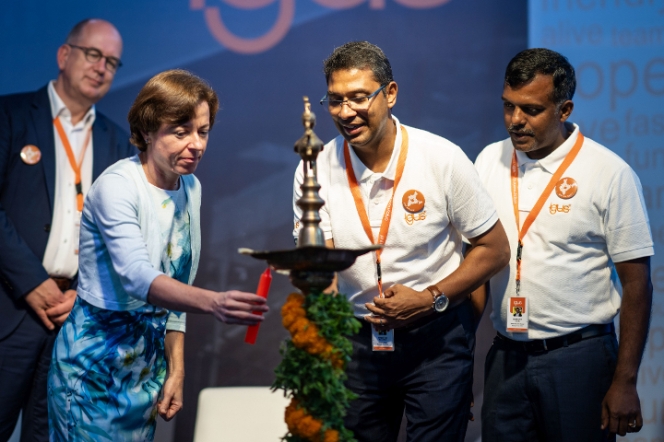
Motion plastics manufacturer, Igus India expanded its footprint in the country by inaugurating a new manufacturing plant spanning 92,000 square feet in Bengaluru Thursday.
The state-of-the-art plant in Mandur near Budigere in Bengaluru comes at a point when the company prepares to focus on new divisions dedicated to the semi-conductor and renewable energy sectors, areas poised for substantial growth. The expansion is part of Igus’s long-term strategy to enhance its operational capabilities and support its extensive customer base in India.
The newly inaugurated facility is a testament to the company’s long-term commitment to India, involving an investment of over INR 1 billion. This financial outlay reflects the company’s dedication to maintaining its competitive edge through innovation and cutting-edge technology.
Of the total investment, INR 200 million have been allocated for setting up the factory, INR 400 million for advanced injection moulding machines and INR 200 million for enhancing the manufacturing process. The plant’s infrastructure is designed to meet the high standards of motion plastics production, ensuring that Igus India continues to deliver world-class products tailored to the unique demands of the Indian market.
Since its establishment as a wholly-owned subsidiary in 2000, Igus India has become a prominent player in the motion plastics industry, catering to over 19,000 customers across the country. The company’s extensive product catalogue boasts 125,000 parts, which are used in a variety of customer-driven assemblies, many of which are customized and assembled locally. This vast array of products underscores Igus’s commitment to innovation and customer satisfaction, with over 200 new products introduced annually. The company’s ability to adapt to the evolving needs of its customers has been a key driver of its success in the competitive Indian market.
Looking ahead, Igus India has ambitious plans to further strengthen its operational capabilities and market presence. The company is eyeing significant revenue growth, with expectations of reaching INR 3.4 billion in revenue this year. To support this growth and enhance its logistical efficiency, Igus India plans to establish new logistics and assembly centres in Pune, Gurugram and Noida. These new facilities will enable Igus to better serve its customers across India, reducing lead times and improving overall service delivery.
The focus on emerging industries like semi-conductors and renewable energy is a strategic move by Igus India to align itself with sectors that are poised for substantial growth in the coming years. As India continues to invest in its semi-conductor manufacturing capabilities and renewable energy infrastructure, the demand for high-quality motion plastics is expected to rise. Igus India’s expansion positions the company to capitalise on these opportunities, offering innovative solutions that meet the specific needs of these rapidly growing industries.
The opening of the new manufacturing facility in Bengaluru marks a significant milestone for Igus India, reinforcing its position as a leader in the motion plastics industry. With a strong commitment to innovation, customer satisfaction and market expansion, Igus India is well-positioned to achieve its growth objectives and continue delivering value to its customers across the country.
Emphasising the strategic importance of this expansion, Igus India Managing Director Deepak Paul stated, “The Indian market presents tremendous potential for Igus as demonstrated by our continued growth and investment here. Our objective is to deliver cutting-edge products and solutions not only to our customers in India but also on a global scale. Igus’s global focus on cost-sensitive and sustainable solutions, encapsulated in our motto ‘Tech up, cost down,’ is perfectly aligned with the Indian approach to technology and innovation. This alignment has been a key driver of our significant growth in the country. As we look forward, our plans include expanding beyond Bengaluru, with logistics and assembly centres set to be established in Pune, Gurugram, and Noida.”
Igus India is currently the 6th largest subsidiary among Igus’s 38 global subsidiaries, a position that reflects its strong performance and growth potential. Over the past two years, Igus India has doubled its market growth, with revenue figures climbing from INR 1.99 billion to INR 3.13 billion. The company expects this upward trajectory to continue. Additionally, Igus India has invested in a clean room testing facility in Germany and plans to establish a similar setup in India, further enhancing its product development and quality assurance capabilities.
Commenting on the occasion, Country Manager and Director Santhosh Jacob said, “Technology and innovation are at the core of everything we do at Igus. With a catalogue of 125,000 parts and 247 new products introduced this year, we are constantly inspired by our customers’ needs to push the boundaries of what is possible. Our ongoing expansion of the motion plastics product world, coupled with the integration of digitalization and AI, is a testament to our long-term corporate strategy. We are making significant progress in embedding digitalization as a key technology at Igus, which will play a crucial role in our future growth and success.”
- Mercedes-Benz Research and Development India
- MBRDI
- Indian Institute of Technology Delhi
- IIT Delhi
- Nirat Ray
- Saurabh Saxena
- Manu Saale
- Preeti Ranjan Panda
MBRDI And IIT Delhi Sign 5-Year Agreement For Advancing Industry-Academia Research
- By MT Bureau
- March 05, 2026
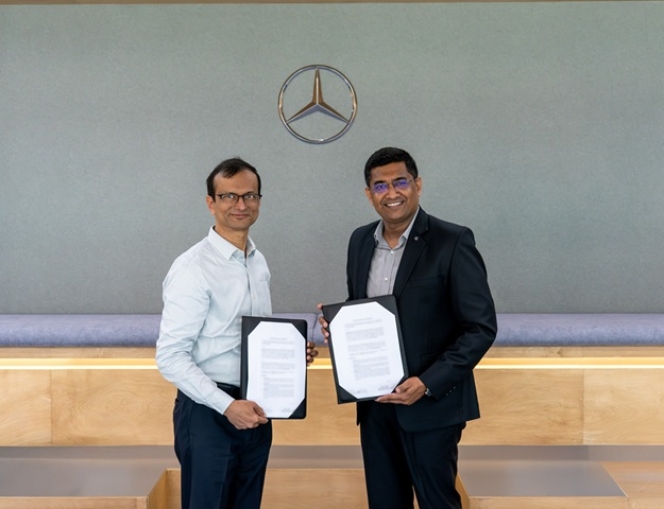
Mercedes-Benz Research and Development India (MBRDI) and the Indian Institute of Technology Delhi (IIT Delhi) have announced a five-year Master Research Agreement (MRA) to facilitate joint research programmes and knowledge development between industry and academia.
The collaboration focuses on technologies including quantum systems, materials, neuromorphic engineering and electric mobility. The initiative seeks to combine academic research with engineering requirements to develop intellectual property and technology solutions.
The first phase of the agreement involves a project centred on quantum sensors and battery systems. This research is led by Prof. Nirat Ray from the Department of Materials Science and Engineering and Prof. Saurabh Saxena from the Centre for Applied Research and Technology.
The partnership will concentrate on:
- Quantum Technologies: Development of sensors for vehicle systems.
- Future Materials: Research into substances for automotive engineering.
- Neuromorphic Engineering: Mimicking biological neural structures for computing.
- Electric Mobility: Advancing battery systems and power electronics.
The teams will work on interdisciplinary research, prototype development, and validation of technologies intended for the mobility sector.
Manu Saale, Managing Director and CEO, Mercedes-Benz Research and Development India, said, “This year marks 140 years since the invention of the automobile, a chapter that reflects the beginning of Mercedes‑Benz’s journey in shaping mobility. MBRDI is also celebrating a milestone as we mark 30 years of engineering excellence in India. We envision a future where academia and industry are systemically partnering to realise real-world challenges and provide meaningful breakthroughs. In that context, our collaboration with IIT Delhi is a significant leap for our legacy of innovation, helping us redefine mobility faster and better. Together, we aim to shape solutions that make a difference today and in the years ahead.”
Prof. Preeti Ranjan Panda, Dean of Corporate Relations at IIT Delhi, stated, “We are pleased to partner with MBRDI in this collaboration, which builds upon IIT Delhi's commitment to enable knowledge exchange and co-creation with industry partners. Through this initiative, the Institute seeks to advance high-quality research and generate impactful innovations that enable sustainable, affordable, and future-ready mobility. Our objective is to develop solutions that address India’s mobility challenges while establishing new benchmarks for global impact.”
3ev Industries And 3eco Systems Partner With Cautio To Deploy AI Dash Cameras Across 10,000 E3Ws
- By MT Bureau
- March 05, 2026
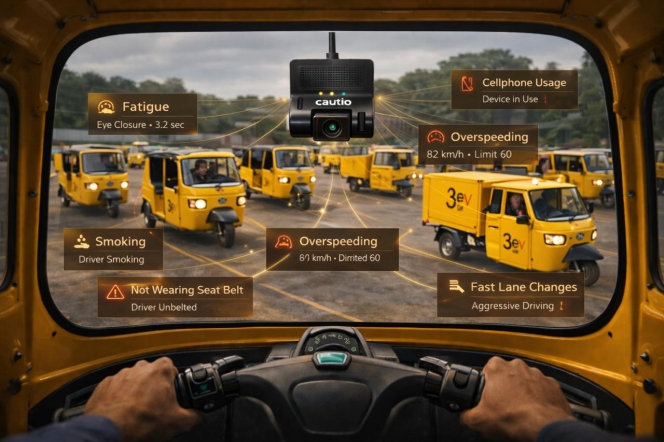
3ev Industries, a Bengaluru-based three-wheeler electric vehicle (EV) OEM manufacturer, and 3eco Systems, a full-stack EV logistics platform, have entered into a strategic partnership with Cautio, one of India’s leading video telematics companies, to install the latter's AI-powered dash camera systems across their electric three-wheeler fleet. The collaboration involves installing systems from Cautio into 10,000 electric three-wheelers. This initiative is designed to enhance protection for drivers, passengers and the wider community, with over 1,200 vehicles already operational in Bengaluru and Chennai. Crucially, Cautio’s dashcams will become a standard factory-installed feature on all new vehicles produced by 3ev.
This move represents a significant shift in India's electric mobility landscape by establishing safety as a fundamental, built-in component from the manufacturing stage. The partnership aims to create a comprehensive data network that links the original equipment manufacturer with the fleet operator while prioritising driver welfare and using data-driven accountability as a key market advantage. As electric fleets expand, the focus is expected to move beyond simply electrifying vehicles to incorporating intelligent systems that ensure safety and operational efficiency.
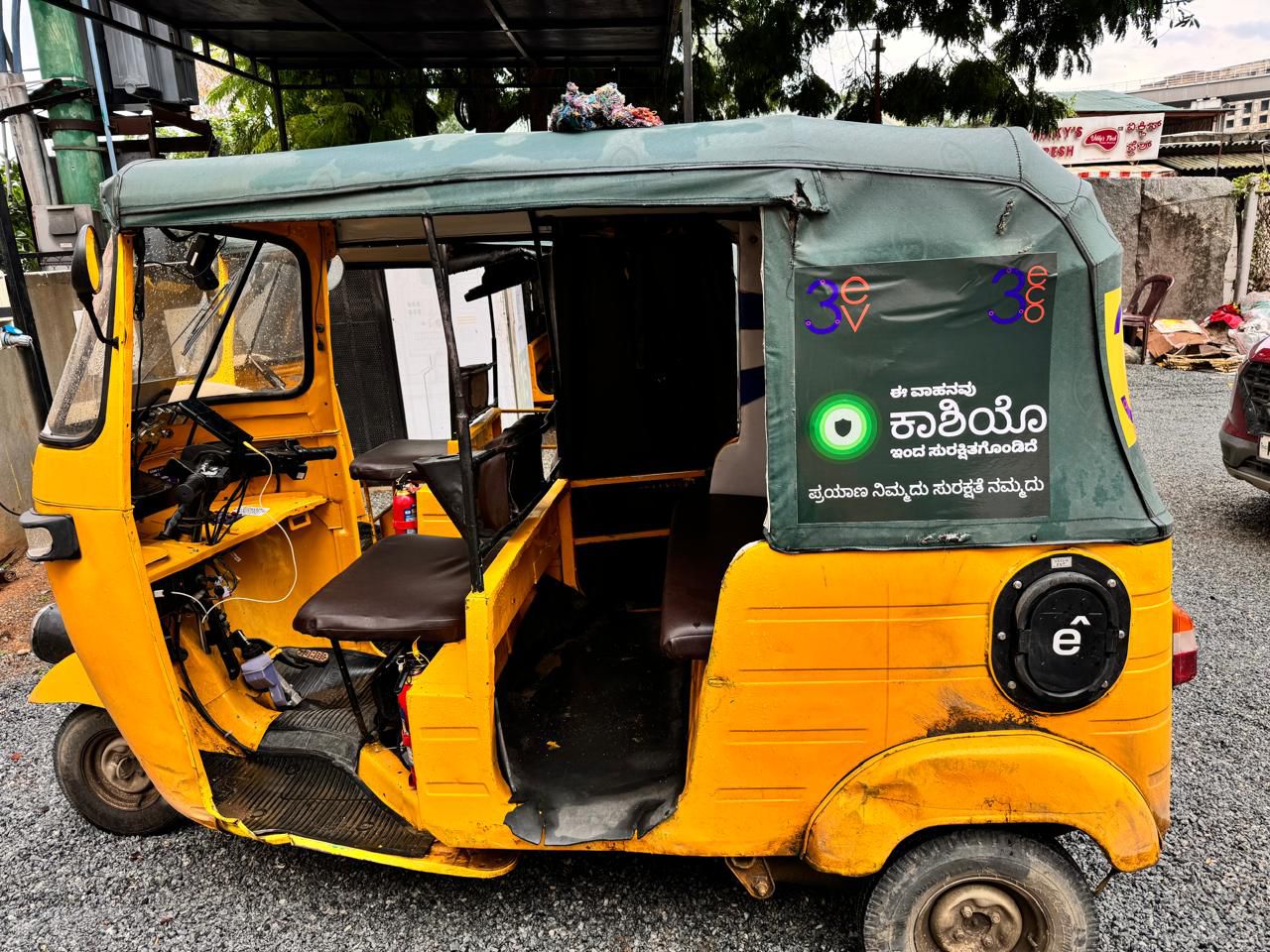
The decision to collaborate with Cautio followed a rigorous assessment of various global and domestic telematics platforms. Key evaluation criteria included performance in edge computing, the precision of real-time alerts and device durability in challenging environments characterised by high temperatures and dust. A pivotal factor was Cautio’s India-centric design philosophy. Unlike systems developed for highway driving in mature markets, Cautio’s technology is specifically tailored for the complexities of Indian urban conditions, such as congested traffic, unreliable 4G connectivity and extreme weather. Its architecture processes data directly on the device, ensuring core safety functions remain operational even without a stable cloud connection, thereby minimising latency and blind spots.
The AI-driven system employs computer vision to continuously monitor driver behaviour, issuing instant alerts upon detecting signs of fatigue, distraction or mobile phone usage. Concurrently, Advanced Driver Assistance Systems (ADAS) analyse the road environment to warn of potential collisions and lane deviations, a critical function in India’s mixed-traffic scenarios. All trip data is consolidated into a centralised dashboard, offering fleet managers real-time, comprehensive oversight of their operations.
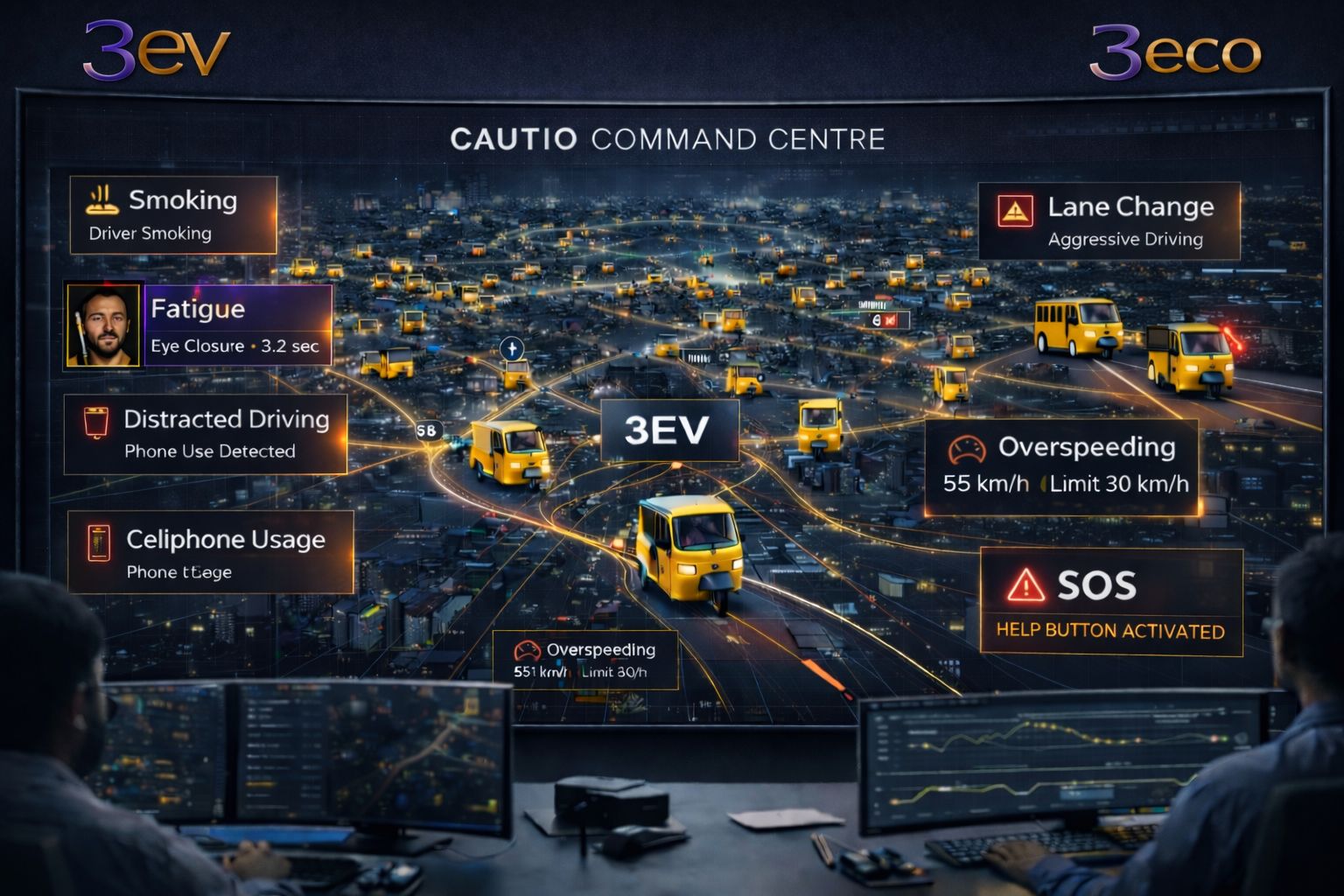
Beyond the hardware installation, the multi-year agreement includes a joint commitment to research and development, driver training and community road safety initiatives. The collective goal is to develop a scalable and structured approach to safety within the electric three-wheeler sector. As citywide fleet electrification progresses and safety regulations evolve, the integration of such embedded AI systems is anticipated to become increasingly vital to operational protocols and risk mitigation strategies.
Suman Mishra, Director, 3eco Systems, said, “Our objective was not just to add monitoring hardware but to deploy technology that meaningfully supports drivers on the road.”
Karan Kadaba, Director, 3ev Industries, said, “Following a detailed evaluation across global and domestic platforms, Cautio emerged as the right partner, combining technical capability with a deep understanding of Indian operating conditions. Other platforms required reliable 4G connectivity that simply does not exist across all our routes. This collaboration reflects our continued focus on building a safety-first operating framework for drivers, fleet partners and passengers.”
Ankit Acharya, Co-Founder & CEO, Cautio, said, “What we are building with 3ev Industries and 3eco Systems is not a vendor-client relationship. It is a shared mission. The electric three-wheeler driver is the new face of India’s urban mobility workforce. These are young people building livelihoods, serving communities, connecting cities. They deserve the same level of safety that protects drivers in premium fleets. But safety cannot stop at a device – it must extend to how we train drivers, how we develop technology and how we hold ourselves accountable to the communities we serve. India is asking for safer roads. With 3ev and 3eco, we are answering. This is more than a deployment. This is the start of building a safer country.”
- 3ev Industries
- 3eco Systems
- Cautio
- ADAS
- driver monitoring system
- Suman Mishra
- Karan Kadaba
- Ankit Acharya
3ev Industries And 3eco Systems To Deploy Cautio AI Dash Cams Across 10,000 EVs
- By MT Bureau
- March 05, 2026
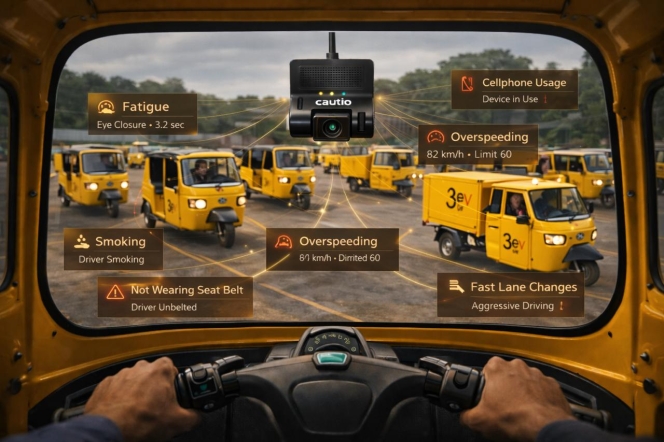
3ev Industries, an electric three-wheeler manufacturer and 3eco Systems, an EV logistics platform, have announced a partnership to equip 10,000 electric vehicles with AI-powered dash cameras. The hardware, manufactured by video telematics company Cautio, will become a standard feature on all vehicles produced by 3ev Industries.
At present, 1,200 vehicles equipped with the technology are operational in Bengaluru and Chennai. The remaining units in the 10,000-vehicle commitment will be rolled out across OEM and fleet platforms, representing a large-scale safety integration for the Indian three-wheeler segment.
The Cautio systems use an architecture designed for Indian urban conditions, characterised by high temperatures, dust and inconsistent 4G connectivity. The technology employs edge computing to process data on the device, reducing reliance on cloud connectivity for safety functions.
The key feature of the integrated AI technology include Driver Monitoring System (DMS), Advanced Driver Assistance Systems (ADAS) sensors, real-time alerts and operational dashboard for fleet operators.
The collaboration extends to joint research and development, driver training programmes, and road safety advocacy. By embedding safety systems at the factory level, the partners aim to establish a framework for risk management as fleet electrification scales.
Suman Mishra, Director, 3eco Systems, said, “Our objective was not just to add monitoring hardware, but to deploy technology that meaningfully supports drivers on the road. Following a detailed evaluation across global and domestic platforms, Cautio emerged as the right partner, combining technical capability with a deep understanding of Indian operating conditions. Other platforms required reliable 4G connectivity that simply does not exist across all our routes.”
Karan Kadaba, Director, 3ev Industries, added, “This collaboration reflects our continued focus on building a safety-first operating framework for drivers, fleet partners, and passengers.”
Ankit Acharya, Co-Founder & CEO, Cautio, said, “The electric three-wheeler driver is the new face of India’s urban mobility workforce. These are young people building livelihoods, serving communities, connecting cities. They deserve the same level of safety that protects drivers in premium fleets. But safety cannot stop at a device - it must extend to how we train drivers, how we develop technology, and how we hold ourselves accountable to the communities we serve.”
- Hyundai Motor Company
- Kia
- Qnovo
- IEA
- BorgWarner
- Blue Earth Capital
- Climate Investment
- Constellation
- RockPort Capital
- US Venture Partners
- Nadim Maluf
- Chang Hwan Kim
Qnovo Gets Strategic Investment From Hyundai And Kia For Advance Battery Intelligence Software
- By MT Bureau
- March 05, 2026
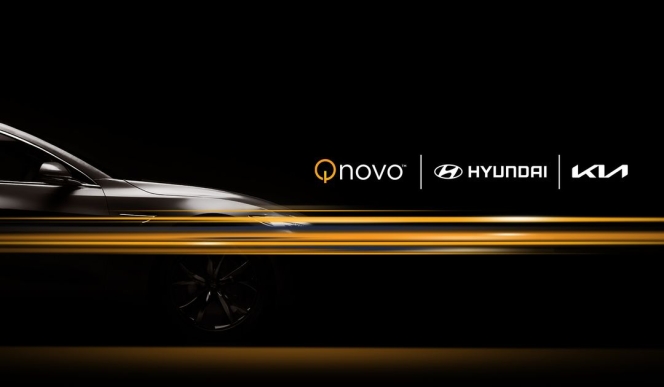
Hyundai Motor Company and Kia Corporation have announced a strategic investment in Qnovo, a developer of battery software. The funding expands an existing collaboration to deploy Qnovo’s battery intelligence software across electric vehicle (EV) platforms and future mobility systems.
The investment follows a period of collaborative testing where Qnovo’s algorithms were validated against the reliability standards of both car manufacturers. The software provides a digital accounting of battery health via a hardware-free architecture, allowing for real-time monitoring of performance and safety.
According to the IEA’s Global EV Outlook 2025, battery demand is projected to reach 4,000 GWh by 2030. As battery adoption increases, the industry faces challenges regarding affordability, reliability, and lifecycle economics.
Qnovo’s technology uses physics-based predictive algorithms to manage battery charging. This data-driven approach is designed to – provide precise data on battery degradation for underwriting warranties; determine residual value by identifying the value of batteries throughout their lifecycle. And optimise performance by managing charging in real-time to maintain safety and longevity.
Hyundai and Kia join a group of investors in Qnovo that includes BorgWarner, Blue Earth Capital, Climate Investment, Constellation, RockPort Capital and US Venture Partners. The collaboration aligns with a shift toward software-defined vehicles where intelligence governs the performance of autonomous systems and robotics.
Nadim Maluf, CEO, Qnovo, said, “Hyundai Motor and Kia’s investment is a testament to the strategic importance of sophisticated battery intelligence for charging and vehicle experience. We are creating a new standard for how batteries are managed, valued and scaled globally.”
Chang Hwan Kim, Executive Vice-President, Hyundai Motor Company, said, “Partnering with Qnovo enables us to integrate the leading battery intelligence into our EV platforms. Qnovo’s unique approach to battery intelligence aligns with our vision for the future of mobility, where software is an important driver of the customer experience and vehicle longevity.”






Comments (0)
ADD COMMENT